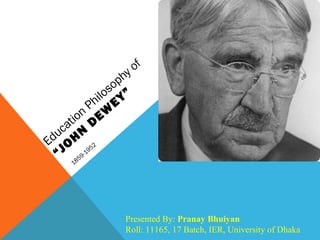
John dewey and his Education philosophy
- 1. Education Philosophy of “JO H N DEW EY” 1859-1952 Presented By: Pranay Bhuiyan Roll: 11165, 17 Batch, IER, University of Dhaka
- 2. INTRODUCING “JOHN DEWEY” • Born On October 20, 1859 in Burlington, Vermont. He was married twice and had six children. • In 1879 he graduated from the University of Vermont . After studying philosophy independently, he entered the graduate program in philosophy at Johns Hopkins University to receive his Ph.D. • From 1884 to 1894 he had a faculty position at the University of Michigan. • In 1894 Dewey joined the University of Chicago where emerged his Pragmatic Philosophy. • Major Dewey's educational theories were presented in these writings: My Pedagogic Creed (1897), The School and Society (1900), The Child and the Curriculum (1902), Democracy and Education (1916), Experience and Education (1938)
- 3. WHAT EDUCATION IS • “I believe that all education proceeds by the participation of the individual in the social consciousness of the race.” • “I believe that the only true education comes through the stimulation of the child's powers by the demands of the social situations in which he finds himself. Through these demands he is stimulated to act as a member of a unity, to emerge from his original narrowness of action and feeling, and to conceive of himself from the standpoint of the welfare of the group to which he belongs.” • “The child has his own instincts and tendencies, but we do not know what these mean until we can translate them into their social equivalents. We must be able to carry them back into a social past and see them as the inheritance of previous race activities.” * Emphasis on individual difference
- 4. DEWEY’S THEORIES AND BELIEFS ON EDUCATION Experiential education: Dewey focused his concept of instrumentalism” in education on “learning by doing or hands-on learning”, which means to learn not only by the theory, but also by the practice. “Instrumentalism” is a theory of knowledge created by Dewey in which ideas are seen to exist primarily as instruments for the solution of problems encountered in the environment. Dewey thought that people learn the best through experience. He thought knowledge could be falsified. Thus, It needed to be consistently challenged and experimented on. He emphasized on inquiry based education.
- 5. DEWEY SEQUENCE PROBLEM-SOLVING Step One: Define the Problem Step Two: Analyze the Problem Step Three: Determine Criteria for optimal Solution Step Four: Propose Solutions Step Five: Evaluate Proposed Solution Step Six: Select a Solution Step Seven: Suggest Strategies to Implement the Solution * Step six and seven were added later
- 6. DEWEY’S THEORIES AND BELIEFS ON EDUCATION The school’s Role: “The school is simply that form of community life in which all those agencies are concentrated that will be most effective in bringing the child to share in the inherited resources of the race, and to use his own powers for social ends.” Dewey stressed the importance of education in school not only as a place to gain content knowledge, but also as a place to learn how to live. He believed that students should be actively involved in real-life tasks and challenges. (Neill, 2005)
- 7. THE DEWEY SCHOOL In January of 1896, Dewey opened the doors of the Experimental University of Chicago with the idea of setting up an “Experimental School” by his own. “the child goes to school to make things: to cook, to sew, to work the wood, and to make tools through acts of simple construction; and in this context, and like consequence of those acts it articulates the studies: reading, writing, and calculus.”
- 8. DEWEY’S THEORIES AND BELIEFS ON EDUCATION Role of Curriculum: Dewey advocated for an educational structure that makes a balance between the child and the curriculum, that is to say, delivering knowledge while also taking into account the interests and experiences of the student. He also rejected curriculum-centered view of education rather than student centered education. Active curriculum should be integrated, rather than divided into subject-matter segments (Brewer, 43) Flexible and Changeable in according to Child’s Interest. Reflect social life and social activities- utilities.
- 9. DEWEY’S THEORIES AND BELIEFS ON EDUCATION The Teacher’s Role: He believed that the teacher’s role should be that of facilitator and guide since the teacher becomes a partner in the learning process who leads students to independently discover meaning within the subject area. Teachers are responsible for achieving the goals of the school, but the specific topics to be studied to meet those goals, cannot be determined in advance because they should be of the interest of the children (Brewer, 43). Learner’s past experience should be taken into account the teaching-learning process, as well as the environment. *Dewey’s educational theory was far less child-centered and more teacher-centered (Westbrook, 1991: 108-109)
- 10. “Education is not preparation for life; education is life itself. Education, therefore, is a process of living and not a preparation for future living.” -John Dewey
- 11. RESOURCES • Brewer, J. A, (2007). Introduction to Early Childhood Education. Boston, Massachusetts: Pearson. • Neill, J. (2005). John Dewey, Philosophy of Education. Retrieved April 19, 2009, from Wilderdom Web site: http://wilderdom.com/experiential/JohnDeweyPhilosophyEducation.html • https://www.wiziq.com/tutorial/61129-John-Dewey-and-Educational- Philosophy • http://www.powershow.com/view/4be26- M2VlY/John_Dewey_Educational_Philosopher_powerpoint_ppt_presentati on# • http://faculty.scf.edu/frithl/SPC1608update/handouts/Dewey.htm
Notas do Editor
- * Emphasis on individual difference * Teacher centric learning *Attaches Importance to materialism